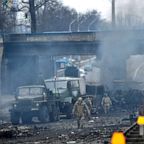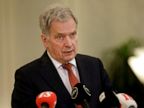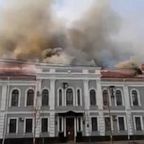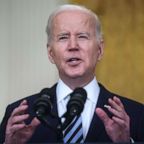The economic results could spark discontent among the Russian people
The U.S. is already working to implement severe sanctions. That’s an important first step. The U.S. and its allies will look to isolate Russia economically, including by cutting Russia out of the Society for Worldwide Interbank Financial Telecommunication (SWIFT) banking network and ensuring the Nord Stream 2 gas pipeline remains off.
While Russia has bolstered its currency reserves in anticipation of this sort of moment, the economic results of this strategy could spark discontent among the Russian people about Putin’s invasion of Ukraine, which has already sparked protests despite the strong risk of arrest.
Certainly, Putin will use Russian propaganda to point the blame back at the West for a weakening of the Russian economy. But, the United States can make it clear to the Russian people that Putin has the power to end sanctions affecting their everyday lives by reversing course.
Perhaps more importantly, the sanctions will seek to hit Russian oligarchs hard. These powerful tycoons are keeping Putin in power. Cutting off their international trade and seizing their assets will make them question whether they want to continue supporting his rule.
Along with economic isolation, another strategy would be to cut off Russia from the world. The U.S. could pressure allies around the world to expel Russian diplomats and shutter their embassies. The Czech Republic has already set a precedent by closing Russian consulates on Czech territory and sending their diplomats home.
Further, the U.S. and its allies can stop issuing visas to Russian nationals. Russian citizens would not be permitted to travel into or through their countries. This travel ban will continue to demonstrate that the West will cut Russia off from the world until Putin abandons his conquest of Ukraine.
That said, diplomatic discussions could remain a possibility, since this conflict will not end through Western military intervention. This includes retaining back-channel diplomatic talks through a government like Austria in order to work with our allies on finding a way forward.
The U.S. could also work with our NATO allies to ensure NATO members in Eastern Europe are protected from further Russian incursion. NATO, led by the U.S., could send additional forces to Eastern Europe and begin plans to permanently station them there. Putin worries about being surrounded by NATO. This action seeks to show him that his unlawful aggression has, in fact, strengthened NATO and he has essentially caused everything he claimed to be concerned about.
Nonetheless, Putin controls one of the world’s largest arsenal of nuclear weapons. The goal would be to not escalate to the point where U.S. and Russian forces are facing off. That said, the U.S. can provide military assistance to the democratically-elected Ukrainian government fighting off an invasion of their sovereign lands. The United States and its NATO allies can accordingly send additional arms immediately for Ukraine to fight off the invading Russian forces.
It’s unclear at the moment just how far Putin will push forward his troops. If they are successful in capturing all or part of Ukraine militarily, resistance groups will start to fight the Russian occupiers. American special operations and intelligence officers have an extensive knowledge base from 20 years of fighting insurgencies in places like Afghanistan. They can work with Ukrainians to support a fierce and effective resistance movement.
As part of this effort, the U.S. and its NATO allies would provide weapons, ammunition, medical, intelligence and financing support to these insurgent movements. The Ukrainian resistance will also need a safe haven for a base of their operations. The U.S. and the rest of NATO would work with Poland and Moldova to support this effort.
The U.S. can also lead the fight in another critical domain: information warfare. For too long, we have endured relentless propaganda targeting American (and Ukrainian) citizens in every aspect of civil society. We can break out of our traditional bureaucratic process to more effectively respond, counter and present our own messages as the leaders of the free world. Again, the goal is to further create dissent internally within Russia that makes Putin focus on his own country and abandon his external ambitions.
In line with this, the United States can endeavor to find ways to creatively bolster its support for Russian civil society and fund Russian opposition movements. Carefully targeted cyber attacks within Russia can also be considered if Russia attacks us via these means.
These types of gray-zone activities are not without risk. Cyberwarfare, for example, may have unforeseen consequences as much of our critical infrastructure is on systems that were designed before this form of warfare was considered.
The tactics to isolate Russia also may not have the immediate desired effect, such as the withdrawal of Russian forces from Ukraine. Nonetheless, the U.S. faces a moral obligation to do what we can to support the Ukrainian people.
Michael “Mick” Patrick Mulroy is a retired U.S. Marine, a retired paramilitary operations officer in the CIA’s Special Activities Center and a former deputy assistant secretary of defense for the Middle East. He is a national security and defense analyst for ABC News, a senior fellow for national security and defense policy with the Middle East Institute and a co-founder of the Lobo Institute.








